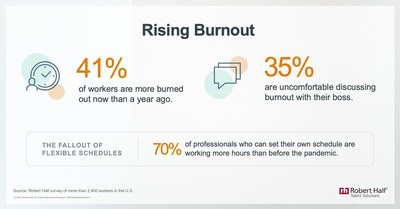Burnout is a growing issue for many workers, including those who have flexible schedules, new research from talent solutions and business consulting firm Robert Half shows. In a survey of more than 2,400 professionals in the U.S., 41% of respondents said they are more burned out now than a year ago. Results are nearly unchanged from a similar 2021 poll, suggesting more must be done to support employees’ mental health and well-being.
Those most likely to report a rise in burnout include:
- Gen Z professionals (47%)
- Technology workers (44%)
- Women (43%)
- Employees who have been with their company for 2-9 years (43%)
- Professionals based in Boston (50%), Charlotte (50%) and San Diego (48%)
At the same time, 35% of workers are uneasy about expressing feelings of burnout with their manager.
“It’s concerning that many professionals continue to feel increased burnout, even as companies are hiring to help manage workloads and business demands,” said Paul McDonald, senior executive director of Robert Half. “Spotting signs of burnout can be harder when employees are working remotely, so it’s especially important for managers to establish regular check-ins, set expectations and encourage staff to speak up if they’re feeling overwhelmed.”
When Schedule Flexibility Backfires
More than three-quarters of professionals (78%) said they have the ability to set their own schedule, but among those respondents, 70% are working more hours than they were before the pandemic. Three-quarters of employees overall (74%) are putting in 40 or more hours a week.
“As more people stray from the typical 9-to-5, employees may feel greater pressure to be available at all hours of the day,” McDonald added. “Establishing rules of engagement — such as sharing your general availability and communicating clear deadlines — can help workers re-establish boundaries and reclaim their personal time.”
The online survey was developed by Robert Half and conducted by an independent research firm. It includes responses from more than 2,400 workers 18 years of age or older in finance, technology, marketing, legal, administrative and customer support, human resources, and other areas at companies with 20 or more employees in 24 major U.S. cities.
Thanks for reading CPA Practice Advisor!
Subscribe Already registered? Log In
Need more information? Read the FAQs
![Burnout%20IG_FINAL_1728x904[1]](https://www.cpapracticeadvisor.com/wp-content/uploads/2022/05/Burnout_20IG_FINAL_1728x904_1_.627c0f646bfbe.png)




